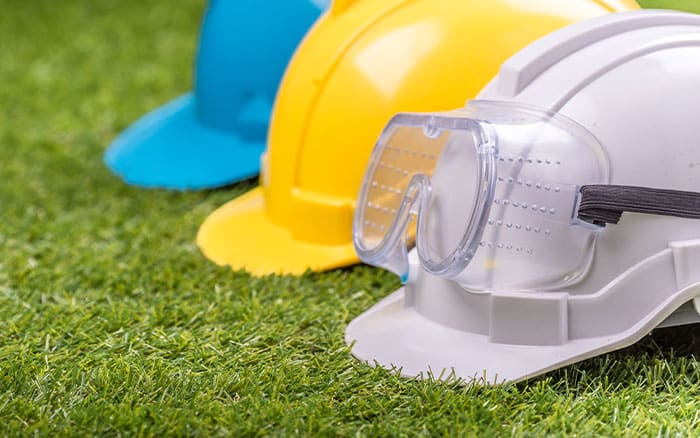At this time of year, we spend a lot more hours in the garden. With heavy jobs to be done, this is a good time to consider how we can stay safe and protected when carrying out gardening jobs. Of course, when thinking of garden safety the first things that come to mind are sharp tools and machinery, but there is much more that we need to consider…
So here’s my top-to-toe guide on garden safety:
Protect your head

Cutting overhead branches can be a pain both figuratively and literally.
Wear a hard hat to protect your precious noggin when tree trimming, and avoid hoodies and scarves that can obscure your vision and get tangled in garden machinery.
The heat can also be a hazard. So, when the sun is beating down, wear a cap or a bushman’s hat.
Lastly, removing items from a cluttered shed can be even more dangerous than the garden work. Keep it organised – especially any high shelving.
Shield your eyes
You’re always up and down when gardening, so you have to be very careful when stooping suddenly – you don’t want to end up with a branch or cane in your eye.
I use old yoghurt pots as cane caps, so I’m protected when bending over. But if you are pruning, cutting, strimming, mowing or digging, safety glasses are a must. Also, your eyes are vulnerable to particles when cutting overhead.

Cover your ears

You would be surprised at the amount of damage you can cause over a long period using loud machines such as strimmers, mowers and shredders.
So, take steps to protect your ear drums when using loud machinery by using earplugs and/or defenders.
Keep your hands safe in the garden
Wearing gloves is always a good idea when using anything from secateurs and shears to a mower.
Never cut what you can’t see, and don’t put both hands into a hedge to prune. In many cases it’s not the hand holding the tool that gets hurt, it’s the other one. I’ve seen far too many shortened fingers over the years!
It’s also important to wear gloves when handling plants, especially as some can cause irritation when they come into contact with skin.

It may seem obvious, but of course you need to be aware of lawnmower blades – make sure the engine is off or unplugged before going near them.
Lastly, always protect cuts and scrapes with a plaster or protective gloves. Keeping a wound clean is absolutely essential when rooting around in soil. You can pick up some nasty pathogens if you’re not careful, including tetanus.
Torso protection

Tough tops and trousers are important, because quality clothing can protect you more than you’d think.
Again, temperature is important. For example, don’t overdress if it’s a hot day, and don’t underdress if it’s cold and wet. If you are working hard on a cold day, be sure to head inside as soon as you finish to avoid a chill as your body cools.
When working in the scorching heat, remember that clothing is the first line of defence, so wearing long sleeves to protect vulnerable skin is a good idea. Though you should always remember to apply sunscreen that is SPF30 or higher.
Be careful with your back
Probably the most common source of chronic pain is back injuries, and they’re easy to incur in the garden. Make sure your back is straight and you take breaks.
Lift with your knees and don’t be a hero – stay within your capabilities if you’re moving paving slabs or composts.

It may surprise you to know that there are as many back injuries from pulling off wellies as there are from digging! So, you can buy a v-shaped tool to help with that.
Be kind to your knees

Kneeling pads or knee guards are the best way to protect your joints and make weeding or planting more comfortable.
Don’t be afraid of getting down on your knees, though – it’s far better than risking your back.
Treat your feet well
Always wear the appropriate footwear. Wellies are fine for soft work but if you’re paving or operating heavy machinery then steel toe caps are the best.
When digging, wear sensible shoes so you don’t suffer from a misplaced stroke of a spade.


Leave A Comment